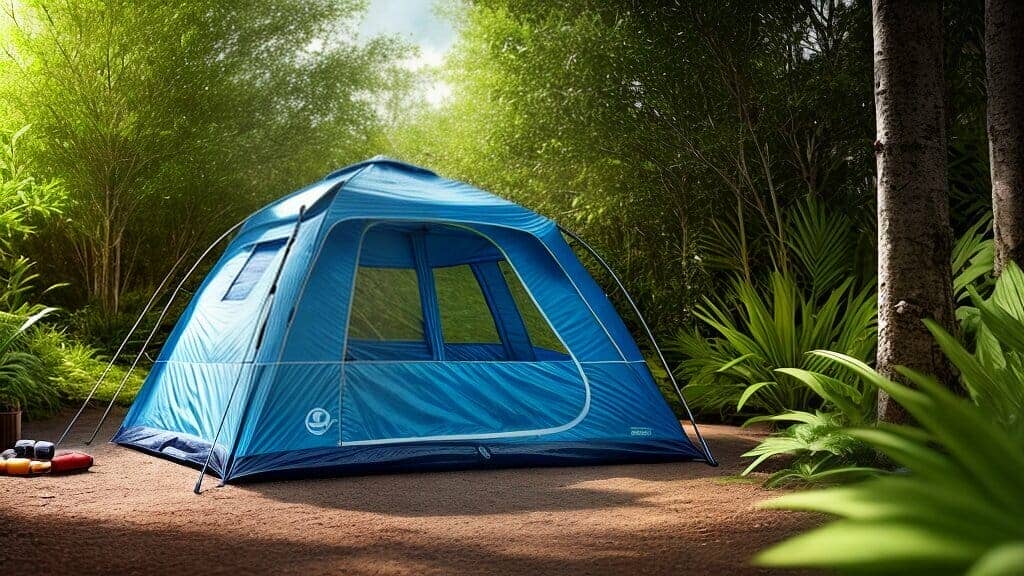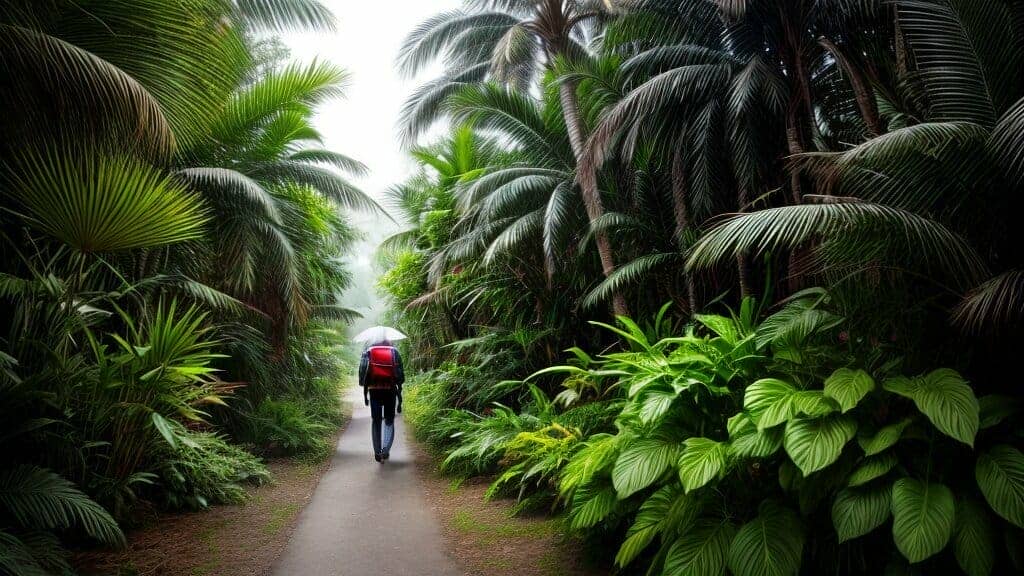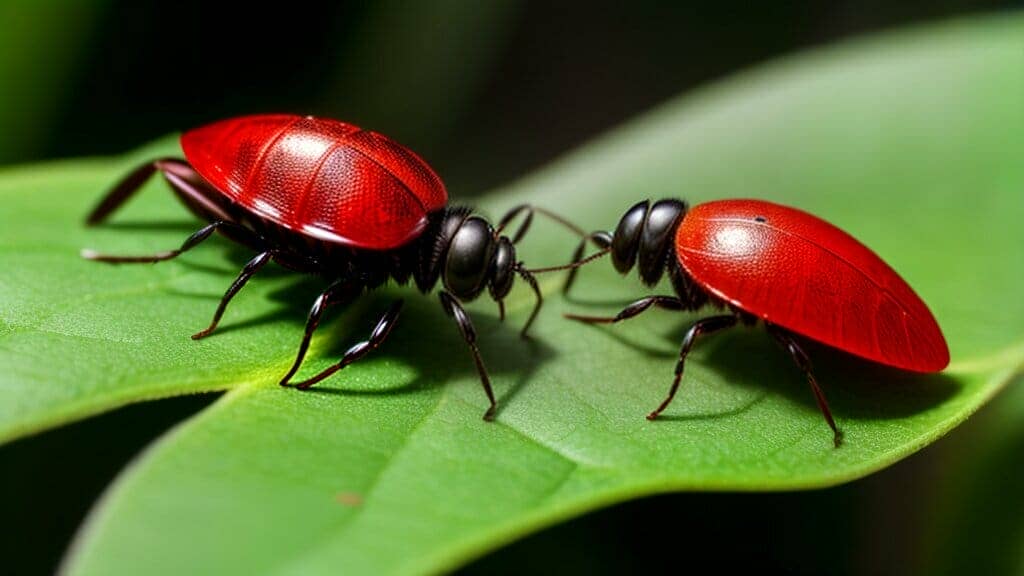Lyme Disease is typically associated with wooded areas and grasslands in temperate climates. However, the truth is that the disease can also be contracted in tropical regions, particularly in places where ticks and other carriers are prevalent. In this section, we will explore the topic of Lyme Disease in tropical regions, including the risks, prevention strategies, and treatment options available in these warm climates.

Key Takeaways:
- Lyme Disease can be contracted in tropical regions where ticks and other carriers are present.
- It is important to be aware of the specific risks and prevention strategies for Lyme Disease in tropical regions.
- Effective treatment options are available, including holistic approaches at Oasis Medical Institute in Tijuana, MX, under the guidance of Dr. Francisco Contreras MD.
Understanding Lyme Disease and its Symptoms
Lyme Disease is a tick-borne illness caused by the bacterium Borrelia burgdorferi and is transmitted to humans through the bite of infected black-legged ticks. While traditionally associated with wooded areas in cool climates, Lyme Disease has been increasingly reported in tropical and subtropical regions worldwide, where ticks and other carriers thrive in warm, humid environments.
Early symptoms of Lyme Disease include fever, headache, fatigue, and a characteristic “bull’s-eye” rash at the site of the tick bite. However, symptoms can vary widely and may resemble other tropical illnesses, such as dengue fever, malaria, or chikungunya.
Left untreated, Lyme Disease can spread to the nervous system, joints, and heart, causing severe and chronic symptoms such as joint pain, fatigue, memory loss, and concentration problems. In tropical areas, where Lyme Disease may be misdiagnosed or unrecognized due to lack of awareness, it is crucial to seek medical attention promptly if any suspicious symptoms occur.
“Early symptoms of Lyme Disease include fever, headache, fatigue, and a characteristic ‘bull’s-eye’ rash at the site of the tick bite.”
Risks of Lyme Disease in Tropical Regions
Lyme Disease is a tick-borne illness that is transmitted through the bite of infected ticks. Tropical regions, characterized by their warm and humid climates, have a high prevalence of ticks and other carriers, making them particularly vulnerable to the spread of Lyme Disease. This section will explore the specific risks associated with Lyme Disease in tropical regions and the factors that make these areas more susceptible to the disease.
| Susceptibility Factors | Description |
|---|---|
| High humidity | Humidity is a key factor in the survival and growth of ticks. Tropical regions with high humidity levels provide ideal environments for ticks to thrive and reproduce. |
| Large populations of wildlife | Wild animals serve as hosts to ticks, and the larger the population of wildlife in an area, the greater the risk of tick infestation. Tropical regions are home to diverse populations of wildlife, which increases the chances of tick exposure. |
| Limited access to healthcare | Many tropical regions have limited access to healthcare and diagnostic services, which can make it difficult to accurately diagnose and treat Lyme Disease. |
| Poor sanitation | Poor sanitation practices, such as inadequate waste management and water treatment, can increase the risk of tick-borne diseases in tropical regions. |
Given these factors, it is crucial for individuals living in or traveling to tropical regions to be aware of the risks associated with Lyme Disease and take appropriate measures to prevent tick bites and seek medical attention if necessary. In the next section, we will provide practical tips on how to prevent Lyme Disease in tropical regions.

Prevention Tips for Lyme Disease in Tropical Regions
Lyme Disease is a serious threat in tropical regions, and it is important to take proper precautions to avoid being infected by ticks. Here are some essential prevention tips:
- Wear protective clothing: Cover as much skin as possible. Wear long pants, long sleeves, and closed-toe shoes. Tuck your pants into your socks or shoes to prevent ticks from crawling up your legs.
- Use insect repellent: Apply a DEET-based insect repellent to exposed skin. Repellents with picaridin or IR3535 are also effective.
- Stay on pathways: Avoid walking through tall grass or wooded areas where ticks are more prevalent.
- Check for ticks: Conduct a thorough check for ticks after spending time outdoors. Be sure to check the scalp, behind the ears, and in the groin area.
- Shower: Shower as soon as possible after spending time outdoors to wash off any unattached ticks.
- Remove ticks safely: If you find a tick, remove it immediately using fine-tipped tweezers. Grasp the tick as close to the skin as possible and pull upward with steady, even pressure. Then, clean the bite area with soap and water or alcohol.
By following these prevention tips, you can significantly reduce your risk of contracting Lyme Disease in tropical regions.
Avoiding tick bites is the best way to prevent Lyme Disease.

Remember, prevention is key when it comes to Lyme Disease. Take the necessary steps to protect yourself and your loved ones from this serious illness.
Diagnosis and Testing for Tropical Lyme Disease
Diagnosing Lyme Disease in tropical regions can be a challenging task, as the disease can present with different symptoms and often mimic other tropical illnesses. Physicians must have a high level of suspicion in areas where Lyme Disease is not commonly found. Getting a correct diagnosis is essential to obtaining appropriate treatment and avoiding long-term complications.
The diagnostic process usually starts with a medical history review and a physical exam. Blood tests can be used to detect antibodies to the bacteria that cause Lyme Disease. However, these tests are notoriously inaccurate, especially in the early stages of the disease, and can generate false negatives, leaving patients undiagnosed. In addition, the blood tests may cross-react with other tropical diseases, such as dengue, malaria, and typhoid fever, resulting in false positives. Therefore, the combination of clinical symptoms and test results should guide the diagnosis.
In some cases, physicians may use other tests, such as the Polymerase Chain Reaction (PCR) test, to identify the DNA of the bacteria in a blood sample. However, the PCR test has a low sensitivity and may generate false negatives if performed too early in the disease course or if the bacteria are not present in the bloodstream at the time of the test. Another test, the Western Blot, can be used to confirm the diagnosis, but it is not widely available.
Overall, diagnosis and testing for Lyme Disease in tropical regions require a multidisciplinary approach involving a combination of clinical symptoms, laboratory results, and the experience and knowledge of physicians familiar with the disease.

Treatment Options for Lyme Disease in Tropical Regions
When it comes to treating Lyme Disease in tropical regions, there are a variety of options available. These can range from conventional methods to more holistic approaches. It is essential to consult with a healthcare professional to determine the best course of treatment for an individual’s specific needs.
Conventional treatments for Lyme Disease typically involve a course of antibiotics. However, these treatments may not always be effective, particularly in chronic or late-stage cases. As a result, patients may require a more integrative approach that addresses the underlying causes of the disease, rather than simply treating symptoms.

At Oasis Medical Institute in Tijuana, Mexico, Dr. Francisco Contreras MD offers a unique integrative treatment program for Lyme Disease. The program combines conventional medicine with holistic therapies to address the physical, emotional, and spiritual aspects of the disease.
Integrative Treatment
The integrative approach to Lyme Disease treatment at Oasis Medical Institute involves a thorough assessment of each patient’s condition to determine the most appropriate course of action. This may include a range of conventional treatments, such as antibiotic therapy, as well as holistic therapies, such as ozone therapy, acupuncture, and nutritional support.
The goal of the program is to support the body’s natural healing processes while addressing the root causes of Lyme Disease. This may involve addressing underlying nutrient deficiencies, reducing inflammation, and supporting immune system function.
Ozone Therapy
One of the primary holistic therapies used in the treatment of Lyme Disease at Oasis Medical Institute is ozone therapy. This involves administering a mixture of oxygen and ozone gas to the body through various methods, such as intravenous infusion or rectal insufflation.
Ozone therapy has been shown to be effective in eliminating harmful pathogens, reducing inflammation, and supporting immune function. It can also improve cellular oxygenation and circulation, promoting overall health and well-being.
Acupuncture
Another holistic therapy offered at Oasis Medical Institute is acupuncture. This traditional Chinese medicine involves the insertion of thin needles into specific points on the body to stimulate healing and balance.
Acupuncture has been shown to be effective in reducing pain, inflammation, and other symptoms associated with Lyme Disease. It can also improve immune system function and promote relaxation and stress reduction.
Overall, the integrative approach to Lyme Disease treatment offered at Oasis Medical Institute provides a comprehensive and personalized approach to care. By addressing the root causes of Lyme Disease and supporting the body’s natural healing processes, patients can achieve improved outcomes and a better quality of life.
Risks of Lyme Disease in Tropical Regions
Lyme Disease is typically associated with colder, wooded areas, but it can also occur in tropical regions. The specific risks associated with Lyme Disease in these warm climates are different, but no less significant. Tick-borne diseases are prevalent in many tropical areas, and Lyme Disease is no exception.
Ticks are often found in tall grass, in and around forests, and near bodies of water, making tropical regions a prime habitat. Tourists traveling to these areas should be particularly cautious, as ticks are more likely to bite people who are not accustomed to the local climate.
| Factors that increase the risk of Lyme Disease in tropical regions include: |
|---|
| Exposure to tick-infested areas |
| Poor sanitation and waste management practices |
| Low public awareness of Lyme Disease in the region |
| Climate change and habitat destruction |
Due to these risk factors, awareness of Lyme Disease in tropical regions is essential to prevent contraction of the disease. It is important to take preventive measures and to seek medical attention immediately if symptoms appear.

“Ticks are often found in tall grass, in and around forests, and near bodies of water, making tropical regions a prime habitat.”
Supporting a Strong Immune System in Tropical Climates
As Lyme Disease can weaken the immune system, it is essential to support it in tropical regions. A strong immune system can help prevent infections and reduce the severity of symptoms. Here are some tips for supporting your immune system:
- Eating a nutrient-rich diet with plenty of fresh fruits and vegetables.
- Staying hydrated by drinking plenty of water.
- Getting regular exercise to boost circulation and improve immune function.
- Getting enough sleep to allow the body to repair and restore.
- Reducing stress through mindfulness practices such as meditation or yoga.
In addition to these lifestyle changes, certain natural supplements have been shown to support immune function and reduce inflammation. Some of these supplements include:
| Supplement | Benefits |
|---|---|
| Probiotics | Support gut health and improve immune function |
| Vitamin C | Boosts immune function and reduces inflammation |
| Vitamin D | Regulates immune response and reduces inflammation |
| Turmeric | Reduces inflammation and supports immune function |
It is important to consult with a healthcare professional before starting any new supplements or making significant changes to your diet or lifestyle.

Remember, a healthy immune system is key to preventing and managing Lyme Disease in tropical regions.
Coping with Lyme Disease in Tropical Regions: Lifestyle Adjustments
Living with Lyme Disease in tropical regions can be challenging, but with some modest lifestyle adjustments, individuals can manage their symptoms and improve their overall well-being.
1. Stay Hydrated
It is essential to remain well-hydrated in tropical climates, especially for those with Lyme Disease. Drinking plenty of water can help flush out toxins and promote the healing process. Experts advise individuals to consume at least eight glasses of water daily. However, you may need to adjust your intake based on the weather and your activity levels.
2. Get Enough Sleep
Getting adequate rest is crucial for individuals with Lyme Disease. The body uses sleep to repair and restore itself, and getting enough sleep can help boost the immune system and reduce inflammation. Experts recommend adults get between seven and nine hours of sleep per night.
3. Engage in Low-Impact Exercise
Regular low-impact exercise can help improve muscle strength, reduce pain and stiffness, and enhance mood. Examples include swimming, yoga, and walking. It is essential to listen to your body and adjust your routine according to your energy levels and any pain or discomfort.
4. Avoid Stressful Situations
Stress can exacerbate Lyme Disease symptoms, so it is vital to avoid stressful situations when possible. Take time to relax, engage in stress-reducing activities, and practice mindfulness techniques. These practices can help reduce stress levels and improve overall well-being.
5. Adopt a Balanced Diet
Eating a well-balanced diet rich in nutrients can help reduce inflammation and boost the immune system. Experts recommend incorporating foods such as leafy greens, fatty fish, nuts, and berries into your diet. Avoiding foods that can trigger inflammation, such as refined sugars and processed foods, can also help manage Lyme Disease symptoms.
With these practical lifestyle adjustments, individuals with Lyme Disease can manage their condition and enjoy their time in tropical regions without compromising their health and well-being.

Research and Advancements in Tropical Lyme Disease
Research on Lyme Disease in tropical regions is ongoing, as the scientific and medical communities seek to better understand the disease and develop more effective treatment options. In recent years, there have been several important advancements in this area.
New Diagnostic Tools
One of the most significant breakthroughs in tropical Lyme Disease research has been the development of new diagnostic tools. These tests are designed to detect the presence of Lyme Disease in patients earlier and more accurately than traditional methods. For example, a study published in The Lancet Infectious Diseases found that using a combination of blood and urine tests was more effective in diagnosing Lyme Disease in its early stages than using just blood tests.
Emerging Therapies
There are also a number of emerging therapies being explored for the treatment of Lyme Disease in tropical regions. For instance, researchers are investigating the use of natural compounds such as curcumin and quercetin, which have been shown to have anti-inflammatory and antioxidant properties that may help reduce symptoms and boost immune function.
Impact on Future Treatment Protocols
As research in this area continues, it is likely that new treatment protocols will emerge for Lyme Disease in tropical regions. For example, some experts believe that a more holistic approach to treating the disease may be necessary, including lifestyle changes, dietary interventions, and stress management techniques.
Keeping Up with the Latest Research
For individuals with Lyme Disease in tropical regions, keeping up with the latest research and advancements in treatment is essential. It is important to work closely with a qualified healthcare provider who is knowledgeable about the disease and can help guide patients through the often complex and challenging treatment process.

Traveling to Tropical Regions: Precautions and Considerations
For individuals with Lyme Disease who wish to travel to tropical regions, there are several precautions and considerations to keep in mind. Firstly, it is important to research the specific area of travel and understand the prevalence of Lyme Disease and other tick-borne illnesses in that region.
It is also recommended to bring along necessary medications and supplies, such as insect repellent, protective clothing, and tweezers for tick removal. It may be helpful to consult with a healthcare provider before departure to discuss any potential risks and necessary preparations.

During the trip, it is important to be vigilant about tick bites and conduct regular checks for any signs of Lyme Disease. It is also helpful to avoid high-risk activities, such as hiking in dense wooded areas without proper protective measures.
Overall, with proper preparation and vigilance, individuals with Lyme Disease can still enjoy travel to tropical regions while minimizing their risk of infection.
Case Studies: Lyme Disease in Tropical Regions
Real-life experiences of individuals diagnosed with Lyme Disease in tropical regions can provide valuable insights into the challenges of managing and treating the condition in warm climates. Two case studies follow, highlighting the unique situations and treatment journeys of these patients.
Case Study 1
Ms. A, a 35-year-old female, sought medical attention at Oasis Medical Institute after experiencing flu-like symptoms, joint pain, and fatigue while on vacation in Costa Rica. She had found a tick on her skin a week earlier but had not removed it immediately. Dr. Contreras diagnosed Ms. A with Lyme Disease and prescribed a three-week course of oral antibiotics, along with a holistic treatment plan that included nutritional counseling, immune-boosting supplements, and acupuncture. The patient’s symptoms improved significantly within a week, and she was able to continue her travels with reduced discomfort. Ms. A maintains regular follow-up visits with Dr. Contreras to monitor her progress and prevent relapses.
Case Study 2
Mr. B, a 40-year-old male, was diagnosed with Lyme Disease in his hometown in the northeastern United States. He decided to move to a tropical region for personal reasons but found it challenging to manage his symptoms in the warm climate. Mr. B experienced recurrent bouts of joint pain, headaches, and brain fog, despite receiving standard antibiotic treatment. After researching alternative therapies, he discovered Oasis Medical Institute and scheduled a consultation with Dr. Contreras. The doctor recommended an integrative approach that combined antibiotics, immune-boosting supplements, low-impact exercise, and mindfulness meditation. Mr. B reported significant improvement in his symptoms within a few weeks and continues to receive ongoing treatment at the institute.

These case studies illustrate the complexity of managing Lyme Disease in tropical regions and the importance of seeking skilled medical guidance. Every patient’s experience with the disease is unique, but a holistic and integrative treatment approach that addresses the underlying causes and supports the body’s natural healing processes can lead to positive outcomes.
Conclusion
Lyme Disease is a serious condition that affects individuals all around the world. However, those living in tropical regions face a unique set of risks and challenges that require special attention. As discussed in this article, prevention is key to avoiding the disease, and there are several strategies that can help individuals protect themselves, such as wearing protective clothing and conducting regular checks for ticks.
If diagnosed with Lyme Disease, prompt treatment is crucial, and there are both conventional and holistic approaches available depending on personal preferences and medical history. Oasis Medical Institute in Tijuana, MX, is one such example of a comprehensive clinic that offers an integrative approach to Lyme Disease treatment that combines traditional medicine with holistic therapies.
Finally, it is important for individuals with Lyme Disease to remember that their condition does not have to limit their lifestyle. By taking control of their health through proper self-care, lifestyle adjustments, and staying up to date on the latest research and advancements, individuals can continue to thrive and live a fulfilling life, even in tropical regions.
FAQ
Q: What is Lyme Disease?
A: Lyme Disease is a tick-borne illness caused by the bacterium Borrelia burgdorferi. It can lead to a range of symptoms, including fever, fatigue, joint pain, and a characteristic rash.
Q: How does Lyme Disease manifest in tropical regions?
A: Lyme Disease can manifest in tropical regions similarly to other areas. However, the specific types of ticks and environmental factors may differ, leading to variations in disease transmission and prevalence.
Q: What are the risks associated with Lyme Disease in tropical regions?
A: The risks of Lyme Disease in tropical regions include exposure to infected ticks or other carriers, such as rodents or birds. The warm climate and abundant vegetation can create an ideal habitat for these disease vectors.
Q: How can I prevent Lyme Disease in tropical regions?
A: To prevent Lyme Disease in tropical regions, it is important to take precautions such as wearing protective clothing, using insect repellents, and conducting regular checks for ticks. It is also advisable to avoid areas with high tick populations, especially during peak times.
Q: How is Lyme Disease diagnosed in tropical regions?
A: Lyme Disease diagnosis in tropical regions typically involves a combination of clinical evaluation, medical history, and laboratory tests. These tests may include serological assays, PCR testing, and analysis of clinical signs and symptoms.
Q: What are the treatment options for Lyme Disease in tropical regions?
A: Treatment options for Lyme Disease in tropical regions may include antibiotics, anti-inflammatory medications, and supportive therapies. It is important to consult with a healthcare professional to determine the most appropriate treatment plan.
Q: What holistic treatments are offered at Oasis Medical Institute?
A: Oasis Medical Institute in Tijuana, MX, offers a range of holistic treatments for Lyme Disease. These include integrative therapies, nutritional counseling, detoxification protocols, and supportive care to enhance overall well-being.
Q: How can I support my immune system in tropical climates?
A: Supporting a strong immune system in tropical climates can be achieved through a balanced diet, regular exercise, stress management, adequate sleep, and the use of natural supplements. Maintaining good overall health is crucial for preventing Lyme Disease.
Q: How can I cope with Lyme Disease in tropical regions?
A: Coping with Lyme Disease in tropical regions involves making lifestyle adjustments, such as managing stress, prioritizing self-care, and seeking support from healthcare professionals and support networks. It is essential to find a balance that works for individual needs.
Q: What research and advancements are being made in understanding tropical Lyme Disease?
A: Ongoing research is focused on improving our understanding of tropical Lyme Disease, including its prevalence, transmission dynamics, and treatment strategies. Advancements in diagnostics, therapies, and prevention methods are continuously being explored.
Q: What precautions should I take when traveling to tropical regions with Lyme Disease?
A: When traveling to tropical regions with Lyme Disease, it is important to consult with a healthcare professional beforehand. Precautions may include obtaining necessary medications, carrying insect repellents, and being aware of local healthcare facilities and resources.
Q: Are there any case studies of Lyme Disease in tropical regions?
A: Yes, there are case studies that document the experiences of individuals diagnosed with Lyme Disease in tropical regions. These case studies provide valuable insights into the challenges faced and the treatment journeys undertaken.
Dr. Francisco Contreras, MD is a renowned integrative medical physician with over 20 years of dedicated experience in the field of integrative medicine. As the Medical Director of the Oasis of Hope Hospital in Tijuana, Mexico, he has pioneered innovative treatments and integrative approaches that have been recognized globally for the treatment of cancer, Lyme Disease, Mold Toxicity, and chronic disease using alternative treatment modalities. Dr. Contreras holds a medical degree from the Autonomous University of Mexico in Toluca, and speciality in surgical oncology from the University of Vienna in Austria.
Under his visionary leadership, the Oasis of Hope Hospital has emerged as a leading institution, renowned for its innovative treatments and patient-centric approach for treating cancer, Lyme Disease, Mold Toxicity, Long-Haul COVID, and chronic disease. The hospital, under Dr. Contreras's guidance, has successfully treated thousands of patients, many of whom traveled from different parts of the world, seeking the unique and compassionate care the institution offers.
Dr. Contreras has contributed to numerous research papers, articles, and medical journals, solidifying his expertise in the realm of integrative medicine. His commitment to patient care and evidence-based treatments has earned him a reputation for trustworthiness and excellence. Dr. Contreras is frequently invited to speak at international conferences and has been featured on CNN, WMAR2 News, KGUN9 News, Tyent USA, and various others for his groundbreaking work. His dedication to the medical community and his patients is unwavering, making him a leading authority in the field.
Contreras has authored and co-authored several books concerning integrative therapy, cancer, Lyme Disease and heart disease prevention and chronic illness, including "The Art Science of Undermining Cancer", "The Art & Science of Undermining Cancer: Strategies to Slow, Control, Reverse", "Look Younger, Live Longer: 10 Steps to Reverse Aging and Live a Vibrant Life", "The Coming Cancer Cure Your Guide to effective alternative, conventional and integrative therapies", "Hope Medicine & Healing", "Health in the 21st Century: Will Doctors Survive?", "Healthy Heart: An alternative guide to a healthy heart", “The Hope of Living Cancer Free”, “Hope Of Living Long And Well: 10 Steps to look younger, feel better, live longer” “Fighting Cancer 20 Different Ways”, "50 Critical Cancer Answers: Your Personal Battle Plan for Beating Cancer", "To Beat . . . Or Not to Beat?", and “Dismantling Cancer.”





















